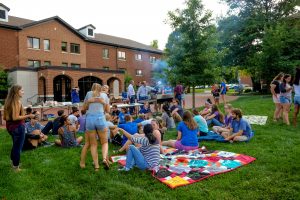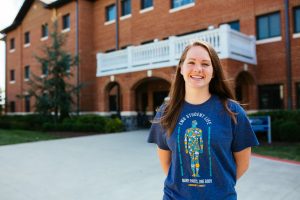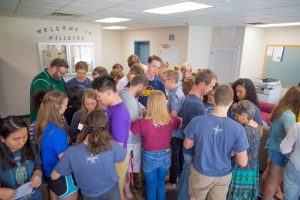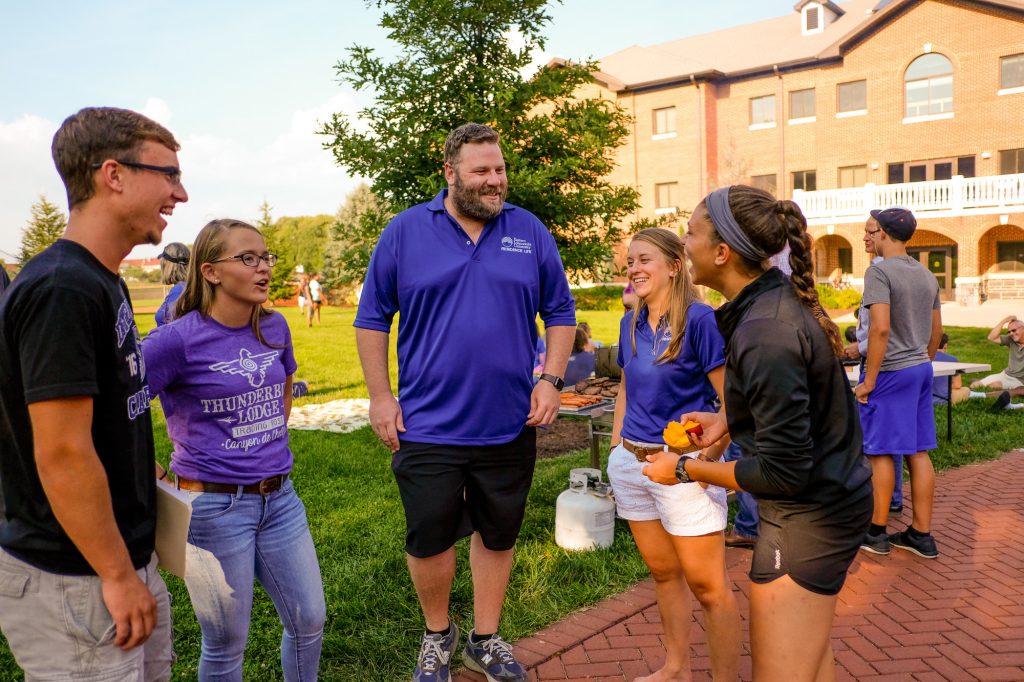Living in a residence hall at Eastern Mennonite University is not just about having a place to stay. Rather, it’s about being part of a caring community. In August, 37 student “community advisors” (CAs) spent the nine days leading up to the reopening of campus for the fall semester experiencing for themselves — and preparing to build, for their fellow students — that important dimension of university life.

In addition to earning certification in mental health first aid and first aid/CPR, the CAs — sometimes along with ministry and pastoral assistants, who were also preparing for the school year — attended numerous training sessions. A sampling of topics included diversity and identity, led by professors Melody Pannell and Celeste Thomas, sex and relationships led by Professor Jerry Holsopple, power and systems led by Professor David Brubaker, and restorative justice practices and conflict styles led by Lorraine Stutzman Amstutz, restorative justice coordinator for Mennonite Central Committee.
A series of meals prepared and hosted by the president’s cabinet and various other departments and faculty reinforced the sense of community and showed that EMU is “an institution that cares deeply,” said Scott Eyre, lead residence director. [Meet the Residence Life staff.]
“Our faculty and staff care for our students and make it easy to enter into conversations and to learn from them, and to invite them into spaces and places. There are a lot of fingerprints on what we do in Residence Life,” he said.
‘All based on care’
As imperative and useful as the skills she learned in the days of training will be, Abigail Shelly, a sophomore social work major from Collinsville, Mississippi, was most inspired by something less tangible. “I think through seeing the different residence directors and people leading, seeing how much care they put into this before we’ve gotten here, has made me feel like I’m better equipped to reflect that on the people who are going to be hall residents,” she said.

All CAs are strongly encouraged to connect intentionally with each pair of roommates early in the first semester, an idea Eyre picked up several years ago from a CA whose hallway “flourished.” That’s just one way CAs will help their diverse hallway communities function in a healthy way, which isn’t an easy task, said Eyre. Hall members can include Mennonites and non-Mennonites, people with different racial and political backgrounds, people with various experiences of what “community” means, and more.
“How do you invite people into a space where all that can translate? How can you help them care, and know and want to be with each other?” Eyre said.
Such attempts also help students make better choices, said Eyre, because “when you know the people you live with in a residence hall, they can come into your decision-making.”
Shelly says that the big picture of care encompasses even the interactions between residence life staff and students who may break rules.
“It’s all based on care. When I heard it last year, I thought, ‘OK, it’s a Christian university, they need to say that’ — but seeing that in action and in conversation? I’d say the sessions have been great, but it’s more about seeing how the RDs care for each other, and then in turn care for us, and then how that will trickle down to the residents, as well. Their cups are completely overflowing,” Shelly said.
‘Investments’
For all their work, Eyre said that CAs might not see the return on the investments they make in people even though those returns may well be very real. “Somewhere down the line, five, ten years from now, people who came here as 18-year-olds to live in this community and maybe don’t quite get it now, or are not really interested in it, all of a sudden they might find themselves married, having kids, working a job, whatever it is. Some of these deposits that these CAs made in their lives early on, right now, they might look back and say, ‘That experience is really helping me right now.’ Maybe the CA will never know, and the residence director will never know, and a professor will never know.”
But sometimes they will know. Eyre can remember — from when he was a CA over a decade ago — people whose words and actions showed that they didn’t like being at EMU. “But some of those people work here now,” he said. “A lot of those people give to the school. EMU changes lives even if you don’t want your life changed while you’re here.”
Shelly, who decorated her hallway with lights and artwork to “set the tone and make it a homey place,” says seeing her freshman year CA bring students with different backgrounds together into a community with “thick and foundational” relationships inspired her to become a CA.

Elizabeth Eutsler, a biology major from Waynesboro, Virginia, also credits her freshman year CA with getting her interested in the role. That CA encouraged her to apply for the job, Eutsler said, even though “I didn’t have the confidence to think that I could do it.” Now she’s a senior and entering her third year as a CA: “It was intimidating, but I was like, ‘I’m going to do this,’ and I did it.”
Eutsler said she gets excited about meeting new people and incoming first-year students, but this year it was something else that made her recommit to the program. “I realized that I had such a great support system in residence life that I couldn’t not come back. It’s such a great community to be in, and it’s just really made me feel at home as a person, and so I decided to stay, because I knew I couldn’t miss out on that aspect of my life. They’ve been great.”
